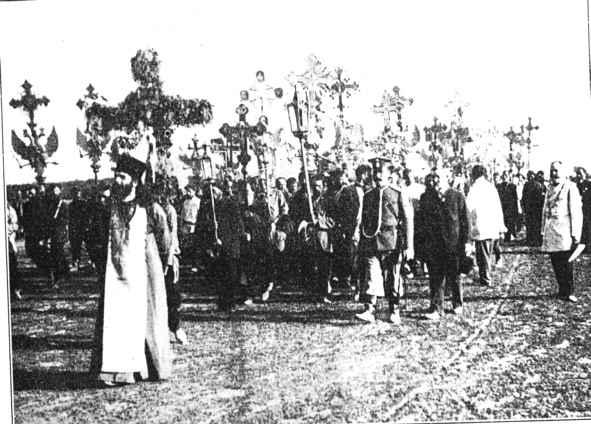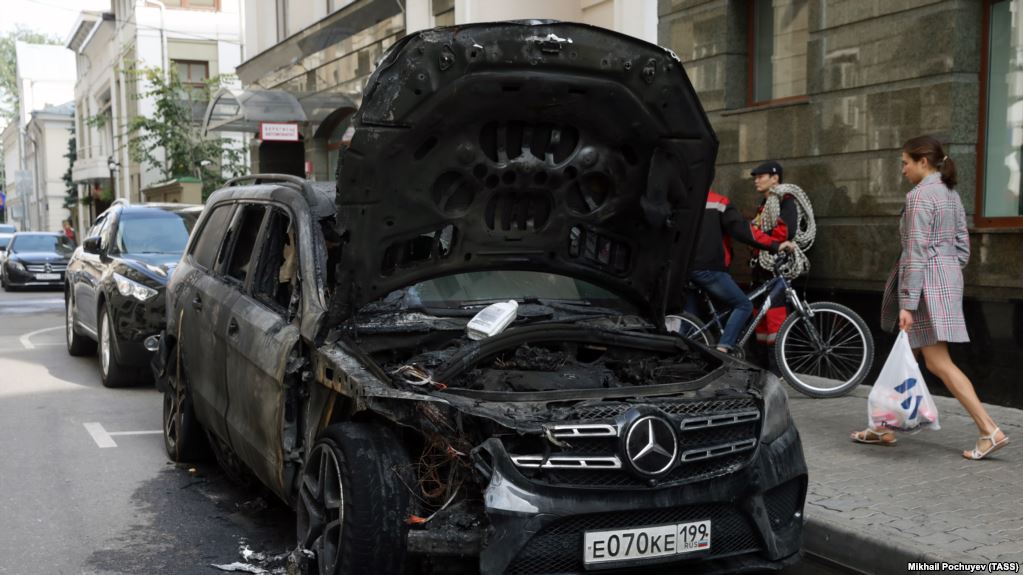In a classical example of Russian suggestions that “everything new is the well-forgotten old,” Nakanune commentator Elena Kiryakova suggests that the challenges Russia faces now echo the threats it encountered a century ago, but with one essential difference.
The notorious xenophobic and anti-Semitic Black Hundreds of the late imperial period have returned in force, she says; but the centrist and leftist forces that opposed them a century ago have not, thus opening the way to a truly horrific future unless something is done and done soon.
She cites with approval the conclusions of Russian historian Aleksandr Kolpakidi that
Kolpakidi says that today “the difference between rich and poor in the country is growing, and this gap will soon be just as enormous as it was in tsarist times. This is obvious. Then the overwhelming majority of the population – 90 percent – were ‘second’ or even ‘third’ class. The very same thing is true now.”

Kiryakova for her part suggests that Natalya Poklonskaya, a Russian State Duma deputy and the leader of the campaign against the film “Mathilda” has become “the informal leader or voice of this mass of ‘Black Hundreds people 2.0’” and continues to “tilt at windmills” even though she has not yet sparked the kind of violence that the tsarist-era Black Hundreds were notorious for.
Poklonskaya has reached back to Black Hundreds mythology, however, to threaten vengeance on all those who attacked or attack the tsar because they represent the same “dark forces” that destroyed the Russian Empire and sparked the murder of the Russian Imperial Family.
According to Yekaterinburg activist Ilya Belous, she has picked up her most notorious ideas from extreme right Russian émigré writers whose works have been circulating in the Russian Orthodox Church of the Moscow Patriarchate since it entered into communion with the Russian Orthodox Church Outside of Russia.
Her activities and those of others like her make it imperative that Russians recall what the Black Hundreds were and what they represented. “Representatives of extreme right organizations in Russia from 1905 to 1917 who operated under the slogans of monarchism, great power chauvinism and anti-Semitism were called Black Hundreds people,” Kiryakova writes.

At first, the Nakanune journalist continues, such people called themselves “‘the true Russians,’ ‘patriots’ and ‘monarchists,’” but then they accepted the term Black Hundreds because that originally referred to the units Kuzma Minin assembled which “led Russia out of its Time of Troubles.”
Among the organizational forms this movement took a century ago were the Russian Monarchy Party, the Black Hundreds, the Union of the Russian People, and the Union of the Archangel Michael, to name just a few.
Kolpakidi says that those who support such ideas now are a threat, although as dangerous as they may be, they won’t necessarily overthrow anyone. In 1917, there were approximately two million people enrolled in various Black Hundreds groups, “but in February 1917, not one of them came out to defend their tsar.”
At the same time, Leonid Lyashenko, a Moscow historian says, one should not underestimate the impact of such groups now and in the future. They represent an attempt to “split society,” first between believers and non-believers, then among all faiths, and on to other possible divisions as well.
Kolpakidi adds that this is leading to another rewriting of Russian history one that will replace the liberal one of the 1990s and the Soviet one of earlier decades. And he says that despite the Moscow Patriarchate’s claim that it is opposed to all this, in fact the church hierarchy is actively supporting it.

And he ends with his own conspiratorial interpretation that echoes those of many in the Black Hundreds movement. “It is no secret,” he says, “that the CIA actively worked via the émigré church. Naturally contacts have been kept up. Perhaps, this was even done specially” for the current purposes.
After all, Kolpakidi concludes, “the Black Hundreds idea appeared in Russia just after the unification of the Russian Orthodox Church with the foreign church.”
Related:
- ‘Situation in Russia is rapidly getting out of control,’ five leading Moscow experts say
- ‘With Crimea, we got Poklonskaya,’ some Russians say in disgust
- Russian historian: Ukrainian war helped make Russia a neo-totalitarian regime that will fall to the Black Hundreds
- Chaplin, ‘a Zhirinovsky from the Orthodox Church,’ says mass repressions necessary and reasonable
- Putin’s Russia well on its way to ‘criminal neo-totalitarianism’ with a ‘neo-terror’ and a ‘neo-GULAG,’ Pastukhov says
- Russian politician: Murderers of opposition figures in Russia rarely caught and those behind them almost never




